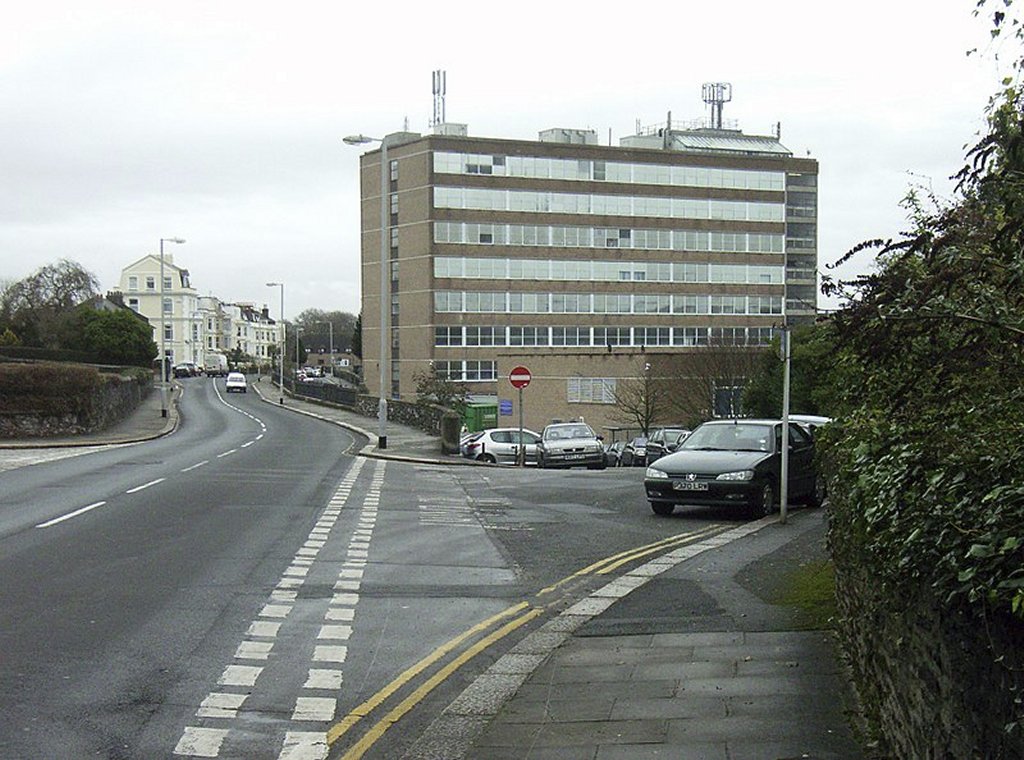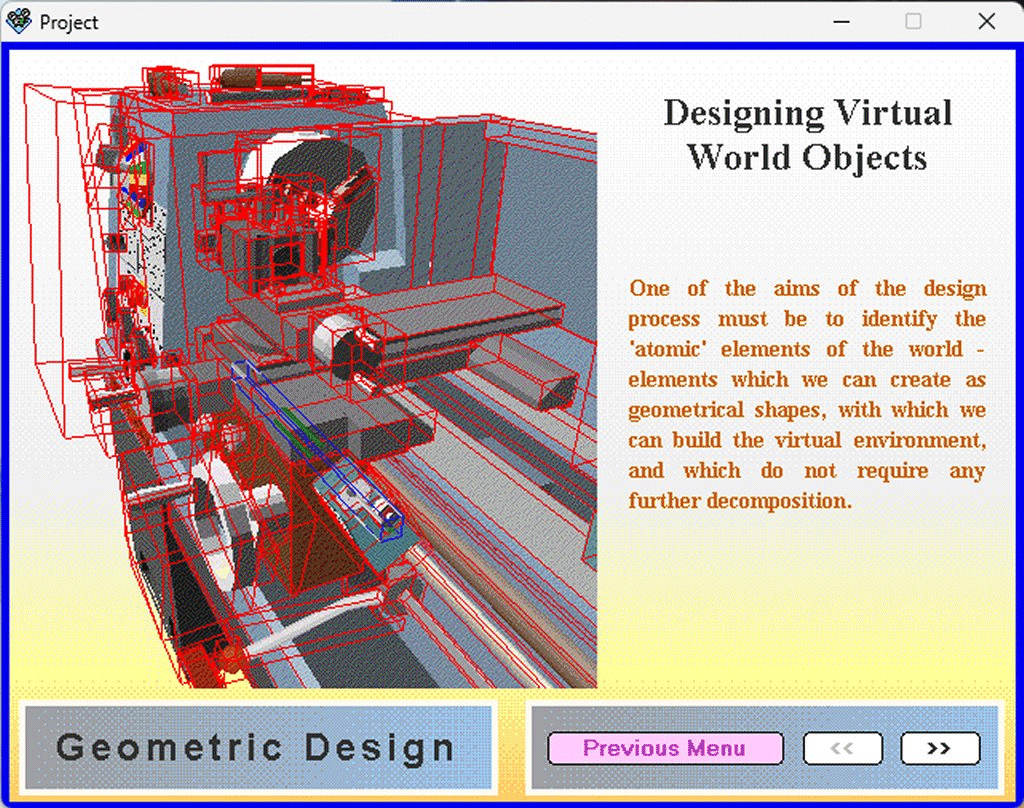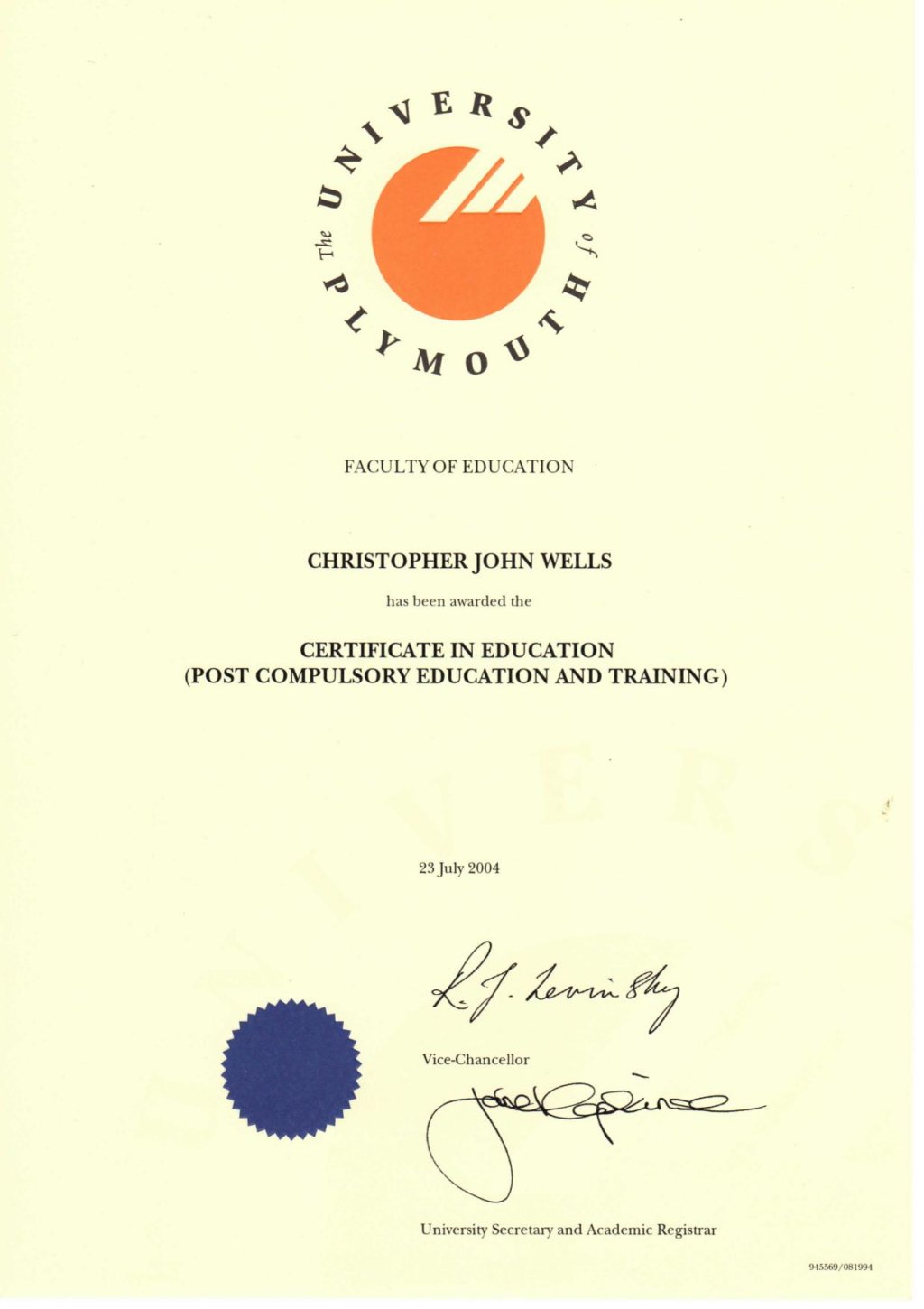

In June 1998 I was appointed by Plymouth College of Further Education (PCFE) to the role of Project Coordinator for educational projects funded by the Europen Union. The projects I worked on involved the development of educational multimedia and virtual learning environments.
The rather unnatractive seven-storey buiding shown in the photograph is the main building in terms of educational activities. It was here where I worked on my projects, and later did most of my teaching. This building was also where most of the staff offices were located, including the office I shared with other members of staff.
Note the telcommunications equipment on the roof. The 7th floor was where most of the telecommunications laboratories were located. Myself, some of the other staff and a number of students were among the first people in the UK to see reports of the attack on the World Trade Center on 9th September 2001, because we were watching live news broadcasts from Al Jazeera at the time.

My role at PCFE during my Industrial/Professional Experience placement at PCFE involved developing virtual learning environments using Superscape's Desktop Virtual Reality software. In order to gain familiarity with the software, I was sent on a two-day training workshop at Superscape's Hook offices in Hampshire.
I subsequently developed a number of virtual learning environments using the software, including a CNC machine, an industrial robot, and a Colchester lathe. The lathe actually won a Superscape award for "World of the Month" and garnered attention from educational and training institutions both in the UK and abroad. This work became the subject of my final year university degree project - "Virtual Reality in Computer Based Learning".

The other projects I worked on, either directly or in a supervisory capacity, involved the development of both online and offline educational multimedia content. This was carried out under the auspices of the European Union's ADAPT initiative, which was intended to encourage educational institutions to develop distance learning materials.
Most of the development work was carried out by multimedia students on professional placements from the University of Plymouth using various multimedia software packages. In hindsight, we could have done a lot of things differently, but it is often impossible to accurately determine future trends in either education in general or the use of technology in delivering educational materials.
Once the European funding dried up, the College's interest in these projects waned swiftly. As ever in recent decades, the trend in higher and further education has been to "follow the money". The only significant funding received by the college from that point onwards came from the UK government, which at the time was awarding funding on the basis of "attendance and achievement".
Unfortunately the former meant that, in practice, the college was under pressure to sign up as many students as possible for courses and keep them there, regardless of other factors. The latter essentially meant that there was similar pressure on the college to award qualifications in situations where (in my opinion) they were not wholly deserved.
This situation did not affect me until 2001, when the last of the ADAPT projects was either completed or abandoned. I was then offered a teaching position, focusing initially on teaching data communications technology.
Even then, the negative consequences of government educational policies did not affect me immediately. I actually found teaching quite enjoyable, because the course I was teaching on catered for armed forces personnel approaching the end of their service and seeking a suitable qualification for a civilian career.
One thing I can say about British armed forces personnel - at least from my personal experience - is that they are extremely well-disciplined and willing to learn. That was sadly not true of many of the school leavers I was to teach in the coming years.
The data communications course also had advantages for the college. Rather than being funded by central government, each student place commanded a significant fee. A small portion of the cost was paid by the student, and the rest was covered by the armed forces. The course was very popular and always fully booked, generating a significant anount of income each year for the college.
Unfortunately, several other colleges in the UK were starting to offer similar courses to armed forces personnel. Due to (in my opinion) a mixture of the lack of investment in necessary resources on the part of the college, and a lack of effort on the part of our marketing department, our student numbers dwindled and we were forced to discontinue the course.
My teaching in future would mostly be on vocational BTEC courses primarily aimed at students who had either left school early or had failed to gain entrance to a university degree course, but who wanted to pursue a career in technology. This meant that most of my students from now on would be in the 16-19 age bracket, although there were also a few mature students who were returning to education as adult learners.

Shortly after I started teaching, the college anounced that all teaching staff were expected to obtain a teaching qualification - either a Certificate in Education (cert. Ed.) or a Post Graduate Certicicate in Education (PGCE). I and several of my colleagues were subsequently enrolled on one or the other of these courses. I opted for the Cert. Ed. simply because this was a two-year commitment as opposed to the three years required for the PGCE.
The qualification was obtained via evening classes run by the University of Plymouth and paid for by the college. In 2004, after two years of part-time study, I duly emerged from the process with my Certificate in Education, although whether it made me a better teacher or not is open to debate.

By 2008, I had become disillusioned with teaching. Not because of the job itself, but because of the ever-increasing burden of paperwork and beaurocracy imposed on teachers due to a combination of government educational policies and the failure of college management to either recognise or attempt to mitigate those burdens.
There were other, not inconsequential problems that I will probably expand on elsewhere. Suffice to say that, when I was offered the possibility of taking early retirement at the age of fifty-five, I was happy to accept. The only thing I have really missed since then is being in a classroom and interacting with a group of students. It wasn't all plain sailing, but it was never dull.
There are some fondly remembered moments, like the time at the end of one course when a group of my students, having discovered I was an avid fan of the TV series "Red Dwarf" presented me with a model of "Starbug 1", a space vehicle frequently featured in that show. It still sits on the shelf above my desk to this day. Thanks guys!